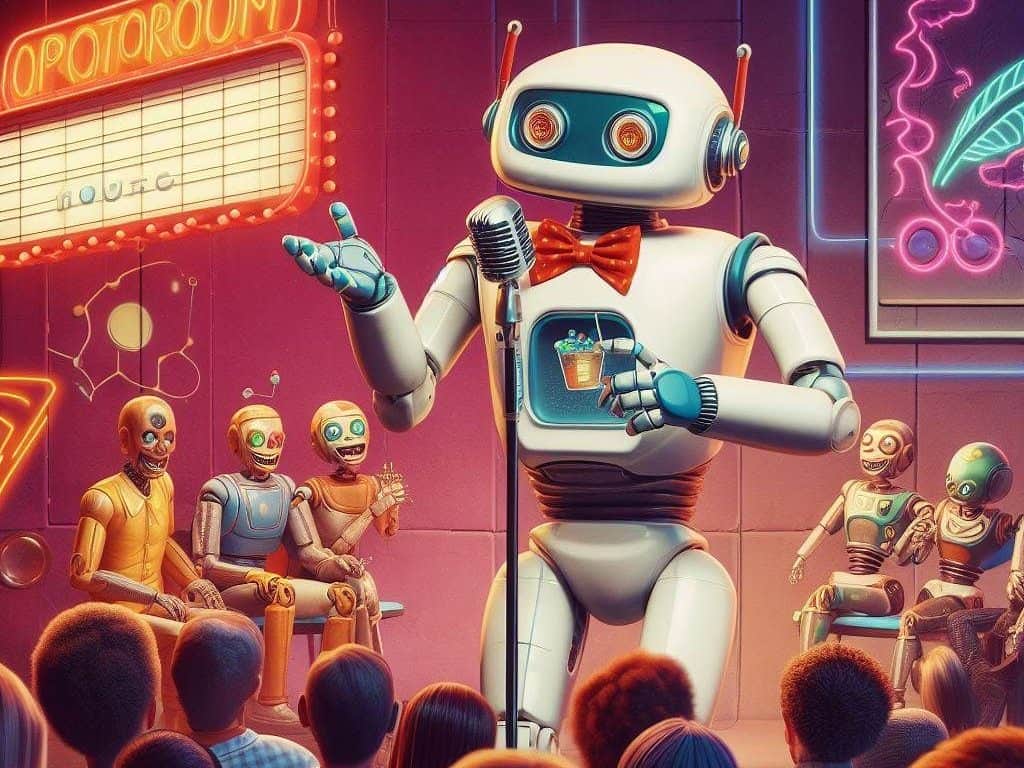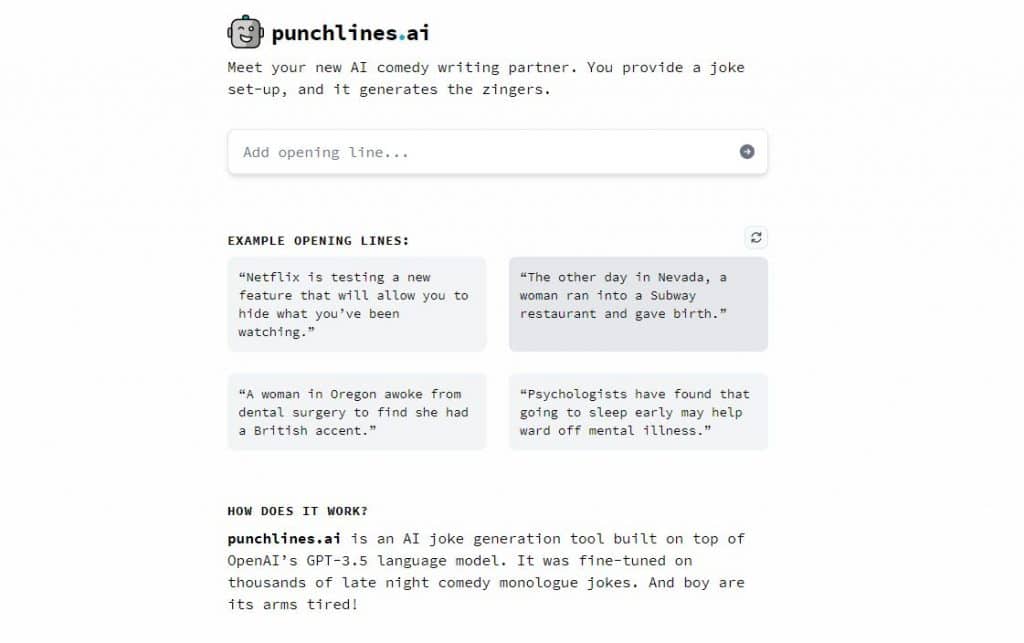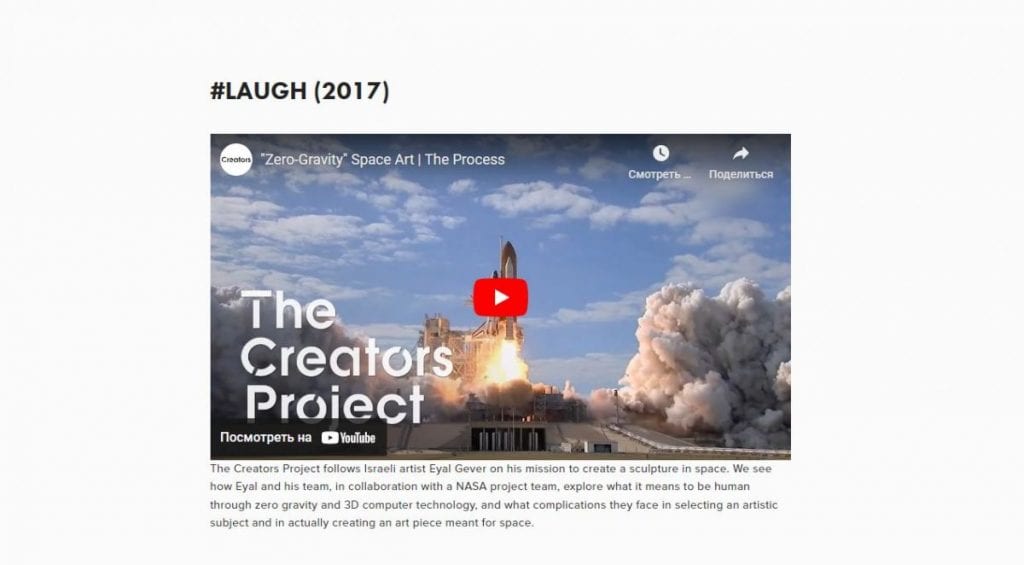

AI-powered joke generators have exploded in popularity as natural language processing drives rapid advances in computational humour. By analysing comedy datasets and understanding the linguistic patterns underlying humour, AI systems can now auto-generate jokes tailored to user prompts and preferences.

Dozens of startups have emerged that use various algorithmic approaches to joke creation, from simple template-based generators to those leveraging cutting-edge AI like GPT or Llama. While output quality varies, the field demonstrates the potential to computationally replicate uniquely human skills like creativity and humour.
1. Punchlines.ai

Punchlines.ai is an AI-powered tool that can generate creative copy for bloggers, musicians, and startups in seconds. The tool is built on top of OpenAI’s GPT-3 language model and fine-tuned on approximately 10,000 late-night comedy monologue jokes. The tool is available on GitHub and can be used to generate jokes in a variety of contexts. Punchlines.ai can also be used to generate other types of content such as blog posts, social media posts, and more. The tool is powered by AI and can generate great copy for a variety of use cases. The tool is easy to use and can be accessed by anyone with an internet connection.
Punchlines.ai was created in 2021 by former Pixar storyboard artists who leveraged their comedy writing expertise to train advanced AI models. Their goal was to develop an AI system capable of delivering high-quality punchlines from basic joke setups. By fine-tuning GPT-3 on a dataset of thousands of late night show jokes, Punchlines.ai learned the structure, formulas, and mechanisms of comedy writing. The tool continues to improve as more conversational data is incorporated into the underlying models.
Key Features
- Uses GPT-3 to generate joke responses based on user-provided setups
- Fine-tuned on a dataset of over 10,000 monologue jokes
- Simple and intuitive web interface
- Can generate multiple punchlines for a single joke setup
- Free and paid subscription plans
Pros
- High-quality jokes generated from a large training dataset
- Ability to get multiple punchline options for one setup
- Easy to use web interface requires no coding skills
- Free version available with decent capabilities
- Actively maintained and improved by developers
Cons
- Paid subscriptions can get expensive for heavy usage
- May occasionally generate nonsensical or inappropriate content
- Limited customization options for free users
2. Vercel AI Joke Generator
Vercel is an all-in-one platform for web development that provides developers with tools to build, deploy, and scale applications rapidly. While not natively an AI system, Vercel enables developers to easily deploy machine learning models and other AI capabilities as serverless functions.
Using Vercel’s serverless functions and edge network, developers can integrate AI joke generators into web and mobile apps with ease. By abstracting away infrastructure complexity, Vercel makes it simple to integrate cutting-edge natural language processing models that auto-generate jokes customized to user input and contexts. Vercel represents a powerful platform for unleashing AI creativity through the lense of humor and joke creation. By handling deployment, scaling, and availability of AI algorithms, Vercel allows innovators to focus on creating the next great comedic AI experience accessible to users worldwide.
Key Features
- Serverless functions to deploy AI models
- Edge network for speed and availability
- Streamlined workflows for deploying web apps
- Automated scaling and infrastructure redundancy
- Integrates with popular frameworks like Next.js
Pros
- Enables seamless integration of AI models
- Automates infrastructure complexity
- Rapid deployment of web experiences
- Global edge network for speed and uptime
- Scales apps instantly based on demand
Cons
- Requires coding skills to fully leverage
- Not a turnkey AI joke generator
- Needs BYO machine learning models
- Limited advanced customization
3. Botnik
Botnik is an AI-powered platform created in 2017 that uses predictive text algorithms to generate funny content and humor. The platform is web-based and has also been used to integrate with other applications to create content ranging from scripts to music lyrics. Botnik leverages the creativity of humans by having them build ‘Datasets’ that the AI then uses to generate content.
The Botnik team aimed to build an AI system capable of computational creativity by studying patterns in different types of content. By training predictive text algorithms on various datasets, Botnik can develop a sense of the structure and patterns of things like movie scripts, song lyrics, or product reviews. The customized datasets infuse Botnik’s AI with a sense of humor and style when producing new text content.
Key Features
- Uses predictive text algorithms to generate content
- Web interface and integrations with apps/sites
- Used to create humorous content like scripts, lyrics
- Some public generators available, can also make private ones
- Paid subscription for $7/month
Pros
- Unique predictive text approach leads to quirky humor
- Great for collaborative and customized generators
- Paid tier unlocks more content generation
- Some high quality public generators
- Active community engagement on site
Cons
- Most content locked behind paywall
- App integrations quite limited currently
- Unique humor style isn’t for everyone
- Public generators can have too much random content
4. Jokebot
Jokebot is an AI-powered chatbot created in 2022 that generates jokes based on conversational user input. It uses natural language processing techniques to understand requests and respond with relevant joke setups and punchlines. Jokebot has web and Facebook Messenger versions available, providing an accessible interface for joke generation.
The creators of Jokebot focused on building an AI system capable of fluid conversational comedy. By analyzing patterns in human conversations, punchlines, and joke delivery, the natural language algorithms powering Jokebot learned to identify humor opportunities within discussions. It can now tell topical jokes, respond with humorous quips, or provide joke setups based on messaging cues.
Key Features
- Chatbot interface generates jokes on request
- Uses NLP and ML to understand requests
- Web version available, also Facebook Messenger
- Generates joke setups and punchlines
- Free to use
Pros
- Natural conversational interface
- Broad range of joke topics and styles
- Completely free access to web and Messenger versions
- Fun way to interact with an AI jokester
Cons
- Typically generates very short 1-2 line jokes
- Joke quality is inconsistent
- Limited customization or guidance of outputs
- Chatbot misses nuance of requests frequently
5. Easy-Peasy.AI
Easy-Peasy.AI offers an AI Joke Generator that allows users to create humorous jokes with ease. This tool is designed to make your friends laugh and can be used to add a touch of humor to various situations. It simplifies the process of generating jokes, making it accessible for those looking to entertain and amuse others.
The goal of Easy-Peasy.AI is to create an AI that understands funny connections and relationships between words and concepts in order to dynamically generate targeted humor. By studying linguistic patterns, punchline structures, and comedic timing, the system aims to algorithmically replicate a human-like sense of humor. Easy-Peasy.AI provides a simple text-based interface where users input topics, keywords, names, or scenarios to generate corresponding jokes or puns. While joke relevance and quality levels vary, the platform represents an ambitious effort to engineer an AI capable of studying, learning, and mimicking human humor abilities.
Key Features
- Generates jokes from user-inputted topics/keywords
- Built with neural networks and ML algorithms
- Simple text-based web interface
- Produces joke setups and punchlines
- Free to use with paid subscriptions
Pros
- Easy-to-use text interface
- Large range of joke topic options
- Paid tier provides unlimited generation
- Can generate multi-sentence jokes
- Actively developed and maintained
Cons
- Joke relevance and quality varies
- Paywall limits free version
- Lack of customization options
- Won’t generate long-form joke stories
6. AI Dungeon
AI Dungeon is a text adventure game created in 2019 that uses OpenAI’s GPT-3 model to generate unlimited interactive fiction scenarios. While not created solely for humor, the powerful text generation capabilities of GPT-3 enable AI Dungeon to produce funny stories and dialog when prompted.
Developed by AI researcher Nick Walton, AI Dungeon was originally built to showcase the potential for AI to generate dynamic and responsive storylines. By fine-tuning GPT-3 on text adventure games and fiction, the AI learned to take user prompts and craft narratives that feel coherent and aligned. This open-ended generation capacity lends itself well to crafting humorous stories with the right user guidance.
Key Features
- Text adventure game with infinite possibilities
- Uses GPT-3 to generate responses
- Create any story genre or scenario
- Online and smartphone app versions
- Free limited version, paid subscriptions
Pros
- Extremely flexible with limitless possibilities
- GPT-3 generates very high quality text
- Paid tier provides advanced features
- Rich storytelling ability in user’s preferred genre
- Engaging and addictive text adventure gameplay
Cons
- Free version has very limited gameplay
- Can sometimes generate concerning violent/sexual content
- Not specifically designed for joke generation
- Requires creativity and effort to shape funny stories
7. Jester
Jester is an AI-based joke generator created in 2021 that produces jokes based on a user’s input prompt. It employs neural networks and machine learning models trained specifically on generating short-form punchline style jokes. Jester provides a simple text interface to input topics or keywords and generate corresponding jokes.
The Jester algorithm was developed by researchers focused on AI humor generation. By studying two-line joke structures and punchline delivery, the machine learning models behind Jester learned to identify comedic patterns and associations. Jester can now take in a user prompt and return joke responses that have context relevance and surprise humor factors calculated by the AI system.
Key Features
- Generates jokes from user keywords/topics
- Built using neural networks and ML algorithms
- Simple, text-based web interface
- Produces joke setups and punchlines
- Free to use with no limits
Pros
- Completely free with unlimited use
- Easy text interface requires no technical skills
- Can produce some clever and funny jokes
- Broad range of joke topics available
- Actively maintained and improved over time
Cons
- Quality of jokes is inconsistent
- Limited to short 1-2 line jokes
- Lack of advanced customization options
- Unable to guide joke generation process
8. Jokester
Jokester is an AI-powered conversational agent built in 2022 that tells jokes based on user prompts. It uses natural language processing to understand requests and respond with funny one-liners or short stories. Jokester has web and mobile versions, including a paid subscription model to remove ads and limits.
The conversational architecture of Jokester aims to create a more natural and intuitive joke experience compared to rigid text generators. By analyzing patterns in joke delivery and context flow during conversations, the natural language algorithms powering Jokester learned to identify opportunities to interject humor. It can now respond to conversations with relevant jokes or propose joke topics based on cues in the discussion.
Key Features
- Chatbot interface for conversing about jokes
- Uses NLP and ML to understand requests
- Available as web and mobile app versions
- Generates joke setups and punchlines
- Free tier and $3 paid subscription
Pros
- Natural conversational interface
- Paid version removes ads and limits
- Mobile app makes jokes accessible on-the-go
- Broad range of joke subject matter
- Actively developed with new content
Cons
- Free version has limited functionality
- Quality of jokes is inconsistent
- Focuses on short 1-2 line jokes
- Chatbot has trouble with nuance in requests
9. LAUGH BY EYAL GEVER
LAUGH BY EYAL GEVER is an AI-powered joke generator created in 2021 that produces jokes based on user prompts and topic inputs. It utilizes generative machine learning models trained explicitly on humor datasets and content. Developed by technologist Eyal Gever, LAUGH BY EYAL GEVER aims to generate longer-form jokes spanning multiple sentences with logical narrative structure leading to a punchline.

The system analyzes joke templates, anecdotal storytelling, and extended joke setup archetypes to algorithmically construct coherent humorous stories from a given prompt. The platform provides crowdsourcing tools for users to rate output quality to further refine the machine learning models. The goal is continuous improvement of relevance, narrative, and funniness factors to achieve human-level joke telling abilities.
Key Features
- Generates multi-sentence jokes from topics/keywords
- Employs neural networks trained on humor
- Text interface and ratings tools
- Creates logically structured jokes
- Free version and paid subscription
Pros
- Intuitive text interface to generate jokes
- Free tier provides basic access
- $7 subscription enables unlimited use
- Multi-sentence joke structure
- Actively developed using crowdsourcing
Cons
- Joke quality varies, especially on free tier
- Subscription required for full capabilities
- Lacks deep user customization options
- Long jokes still limited in length
10. AI Is A Joke
AI Is A Joke is an AI-powered joke generator that uses machine learning algorithms to generate jokes based on user input. The tool is designed to create jokes, puns, or humorous takes on a particular subject on demand. The system analyzes patterns in joke construction, punchlines, comedic timing, and more to algorithmically construct coherent humorous stories from a given prompt.
AI Is A Joke provides a simple text-based interface where users can input topics, keywords, names, or scenarios to generate jokes about. The tool is built with machine learning algorithms and produces joke setups and punchlines based on user-inputted topics/keywords. While joke quality varies, the system represents an attempt to engineer an AI capable of truly understanding and generating humor.
Key Features
- Generates jokes from user-inputted topics/keywords
- Built with machine learning algorithms
- Simple text-based web interface
- Produces joke setups and punchlines
Pros
- Easy-to-use text interface requires no technical skills
- Large range of joke topic options
- Free to use
Cons
- Inconsistent joke relevance and quality
- Lacks deep user customization options
11. Jokester.ai
Jokester.ai is a conversational AI bot created in 2021 that tells jokes based on user prompts. It uses natural language processing and machine learning to understand requests and respond with funny punchlines or short stories accordingly. Jokester.ai has web and mobile app versions, including a $3 per month subscription offering. The founders of Jokester.ai focused on creating an AI system capable of casual conversational humor. By studying real-world conversations and joke deliveries, Jokester learned comic timing and how to identify laughter opportunities.
The conversational interface allows users to joke around naturally with the AI. Jokester.ai looks for chances to interject lighthearted puns, relevant wisecracks, or segues into joke topics brought up. The continuous ingestion of conversational data from users helps train Jokester’s comedic sensibilities and language processing abilities over time.
Key Features
- Chatbot interface for requesting jokes
- Built using NLP and ML algorithms
- Web and mobile app access
- Creates joke setups and punchlines
- Free and $3/month subscription
Pros
- Conversational interface is intuitive
- Mobile app allows on-the-go joke access
- Paid version removes limits of free tier
- Large library of joke topics and styles
- Actively developed and maintained
Cons
- Free version has very limited functionality
- Quality of jokes is inconsistent
- Focuses mostly on short 1-liner jokes
- Chatbot lacks nuance for tailored requests
12. Jokes4Us
Jokes4Us is a user-generated joke database launched in 2008 containing tens of thousands of jokes, one-liners, and other humorous content. While not algorithmically generated, the platform employs moderators and user voting to score jokes and serve up relevant funny content. As one of the largest crowd-sourced joke databases online, Jokes4Us provides a valuable library of human-created humor. The collection spans a wide range of styles from knock-knock jokes to one-liners, categorized across over 60 themes. Users can browse joke listings or use basic search to find jokes tailored for their sense of humor.
While not AI-powered, the vast trove of crowd-sourced jokes makes Jokes4Us a useful humor asset. It provides a glimpse into the types of jokes humans find funny which can help train and evaluate AI systems. As an supplemental joke resource, the scale and diversity of the database make it valuable despite its lack of algorithms.
Key Features
- Searchable database of tens of thousands of jokes
- Includes one-liners, knock-knock jokes, riddles and more
- Organized into over 60 joke categories
- Clean, ad-free interface
- Totally free access and use
Pros
- Massive collection of jokes easily searched
- Covers wide range of joke styles and topics
- Completely free unlimited access
- Clean and intuitive interface
- Actively moderated and growing database
Cons
- Not automated generation, all user-submitted jokes
- Quality varies across large database
- Few advanced search/filtering options
- Some categories have little relevant content
13. JokeAPI
JokeAPI is an API created in 2021 that serves up jokes from various categories through API endpoints. Developers can integrate JokeAPI into their apps and platforms to add humor or entertaining content more easily. While not an AI generator, JokeAPI provides convenient access to a database of over 500 curated jokes. It covers over 20 categories ranging from programming humor to holiday jokes to give developers flexible options for integrating humor. JSON responses make it simple for apps to display jokes or incorporate them into workflows.
For software engineers, JokeAPI solves the problem of building and maintaining a joke database. By handling categorization, filtering, and serving jokes via API, it enables developers to skip straight to the integration stage. While basic, it provides a useful foundation for adding contextual and relevant humor into apps and websites.
Key Features
- API for generating jokes programmatically
- Over 20 joke categories available
- Integrate into apps and codebases
- JSON responses make it easy to parse
- Freemium access, free for limited use
Pros
- Easy integration into software projects
- Pre-categorized jokes makes targeting humor easy
- Free tier enables basic access
- Actively maintained and growing
Cons
- Very limited functionality on free tier
- Restricted customization or input options
- Quality varies across large database
- Not advanced generative AI
14. ChatGPT AI Joke Generator
ChatGPT is an AI system created by Anthropic in 2022 that is capable of generating human-like text for a wide range of prompts. While not specifically designed as a joke generator, ChatGPT contains the natural language capabilities to produce humor and jokes when prompted appropriately. ChatGPT was trained on vast datasets encompassing online dialogues, fiction stories, technical documentation and more. This broad knowledge enables ChatGPT to bring its expertise to creative tasks like joke writing with the proper guidance.
The conversational interface allows users to prompt the AI to generate punchlines, continue joke setups, or construct humorous stories. As an AI assistant accessible to the general public, ChatGPT provides a glimpse at the current capabilities and limitations of language models for humor generation. While joke quality varies, its advanced training empowers it to produce jokes tailored to specific topics and contexts when users provide sufficient direction. ChatGPT represents an important benchmark in publicly available AI humor creation tools.
Key Features
- Conversational interface for flexible prompting
- Trained on massive text datasets
- Accessible free web version available
- Can generate jokes when appropriately guided
- Created by AI research company Anthropic
Pros
- Easy conversational prompting interface
- Cutting-edge AI creates human-like responses
- Free access with no limits
- Can produce high quality jokes with proper guidance
- Actively maintained and improved
Cons
- Not specifically designed for humor or jokes
- Quality varies without clear prompting
- Lacks controls beyond conversational guidance
- Prone to repetition without creativity cues
15. The Dad Joke Generator
The Dad Joke Generator is a simple web app created in 2020 that produces dad-style jokes with the click of a button. It uses a basic machine learning algorithm trained specifically on generating corny dad puns and one-liners. This narrow AI generator focuses completely on mastering dad humor in the form of groan-worthy wordplay and obvious puns. The stripped down interface has users click a button to instantly get a random dad joke. The limited scope and basic ML enables fast delivery of consistent dad-specific joke content.
While basic compared to advanced creative AI systems, The Dad Joke Generator succeeds at its singular goal – delivering immediate cringe-worthy dad jokes. For those seeking specifically this style of humor, it provides a steady stream of punny content in an easy-to-use minimalist package.
Key Features
- Click button to generate random dad jokes
- Built using machine learning algorithms
- Optimized for corny dad-style humor
- Minimal and ad-free interface
- 100% free unlimited use
Pros
- Perfect for easily accessible dad jokes
- Machine learning yields coherent jokes
- Minimal interface with no ads or clutter
- Niche focus on corny humor
- Free unlimited use
Cons
- Very simplistic and limited functionality
- Focuses only on a narrow style of humor
- No advanced options or customization
- Joke relevance can be hit or miss
FAQs
What is an AI joke generator tool?
An AI joke generator tool is a computer program or application that uses artificial intelligence and natural language processing to create jokes, puns, and humorous content.
How do AI joke generators work?
These tools work by analyzing vast amounts of text data, understanding language patterns, and then generating jokes or humorous content based on the input or user preferences.
Are there free AI joke generator tools available?
Yes, there are both free and paid AI joke generator tools. Some have limited functionality in their free versions, while others offer more features in paid versions.
What are some practical applications of AI joke generators?
AI joke generators can be used for entertainment, content creation, social media marketing, and even in chatbots to add a humorous touch to conversations.
Can AI joke generators personalize jokes for specific audiences?
Some AI joke generators can be customized to target specific audiences or adapt their humor style based on user preferences.
Conclusion
In summary, AI joke generators mark an intriguing evolution of artificial intelligence into replicating emotive capabilities once thought impossible for machines. As these tools continue honing the craft of algorithmic comedy, the future looks bright for human-computer collaboration in the humor domain.
Disclaimer
Any data, text, or other content on this page is provided as general market information and not as investment advice. Past performance is not necessarily an indicator of future results.


The Trust Project is a worldwide group of news organizations working to establish transparency standards.
Damir is the team leader, product manager, and editor at Metaverse Post, covering topics such as AI/ML, AGI, LLMs, Metaverse, and Web3-related fields. His articles attract a massive audience of over a million users every month. He appears to be an expert with 10 years of experience in SEO and digital marketing. Damir has been mentioned in Mashable, Wired, Cointelegraph, The New Yorker, Inside.com, Entrepreneur, BeInCrypto, and other publications. He travels between the UAE, Turkey, Russia, and the CIS as a digital nomad. Damir earned a bachelor’s degree in physics, which he believes has given him the critical thinking skills needed to be successful in the ever-changing landscape of the internet.

Damir is the team leader, product manager, and editor at Metaverse Post, covering topics such as AI/ML, AGI, LLMs, Metaverse, and Web3-related fields. His articles attract a massive audience of over a million users every month. He appears to be an expert with 10 years of experience in SEO and digital marketing. Damir has been mentioned in Mashable, Wired, Cointelegraph, The New Yorker, Inside.com, Entrepreneur, BeInCrypto, and other publications. He travels between the UAE, Turkey, Russia, and the CIS as a digital nomad. Damir earned a bachelor’s degree in physics, which he believes has given him the critical thinking skills needed to be successful in the ever-changing landscape of the internet.
Read More: mpost.io









 Bitcoin
Bitcoin  Ethereum
Ethereum  Tether
Tether  XRP
XRP  Solana
Solana  USDC
USDC  Dogecoin
Dogecoin  TRON
TRON  Cardano
Cardano  Lido Staked Ether
Lido Staked Ether  Wrapped Bitcoin
Wrapped Bitcoin  Sui
Sui  Hyperliquid
Hyperliquid  Wrapped stETH
Wrapped stETH  Chainlink
Chainlink  Avalanche
Avalanche  Stellar
Stellar  Bitcoin Cash
Bitcoin Cash  Toncoin
Toncoin  LEO Token
LEO Token  Shiba Inu
Shiba Inu  USDS
USDS  Hedera
Hedera  Monero
Monero  WETH
WETH  Litecoin
Litecoin  Wrapped eETH
Wrapped eETH  Polkadot
Polkadot  Binance Bridged USDT (BNB Smart Chain)
Binance Bridged USDT (BNB Smart Chain)  Bitget Token
Bitget Token  Ethena USDe
Ethena USDe  Pepe
Pepe  Pi Network
Pi Network  WhiteBIT Coin
WhiteBIT Coin  Coinbase Wrapped BTC
Coinbase Wrapped BTC  Dai
Dai  Aave
Aave  Uniswap
Uniswap  Bittensor
Bittensor  Ethena Staked USDe
Ethena Staked USDe  Cronos
Cronos  Aptos
Aptos  OKB
OKB  NEAR Protocol
NEAR Protocol  BlackRock USD Institutional Digital Liquidity Fund
BlackRock USD Institutional Digital Liquidity Fund  Jito Staked SOL
Jito Staked SOL  Ondo
Ondo  Internet Computer
Internet Computer  Ethereum Classic
Ethereum Classic